2023年中考英语语法专题课件之动词的时态(共23张PPT)
文档属性
| 名称 | 2023年中考英语语法专题课件之动词的时态(共23张PPT) |

|
|
| 格式 | zip | ||
| 文件大小 | 658.4KB | ||
| 资源类型 | 教案 | ||
| 版本资源 | 人教新目标(Go for it)版 | ||
| 科目 | 英语 | ||
| 更新时间 | 2022-08-03 00:00:00 | ||
图片预览

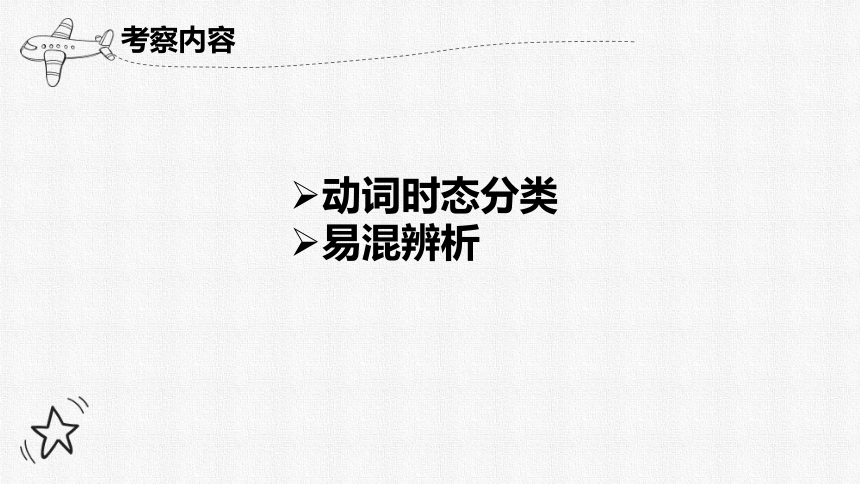
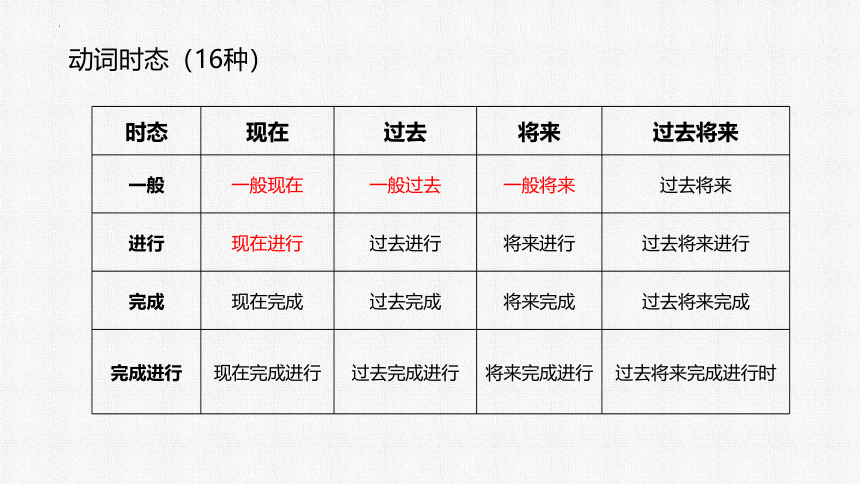
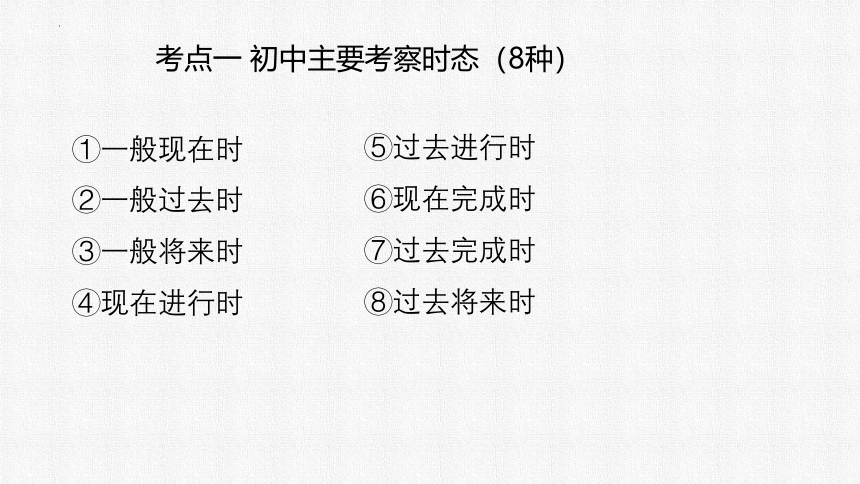
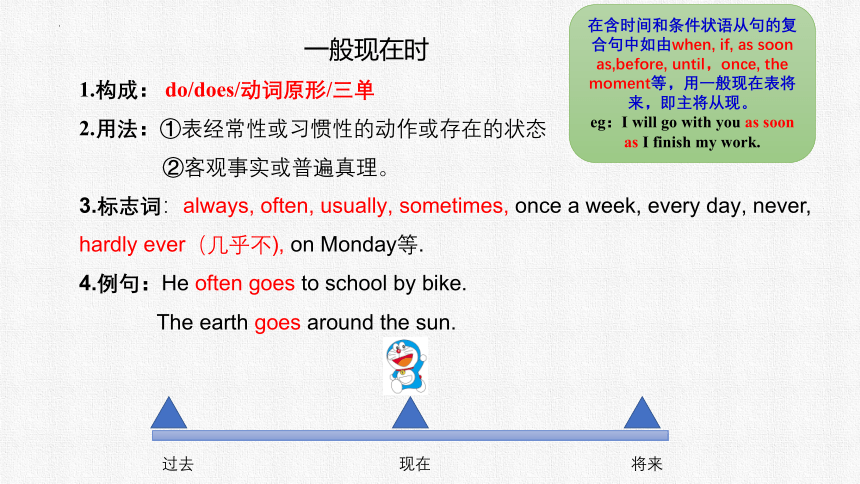
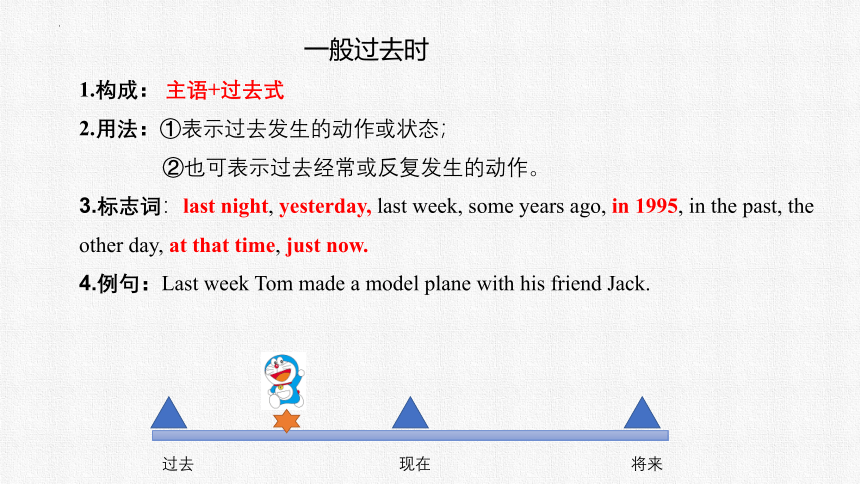
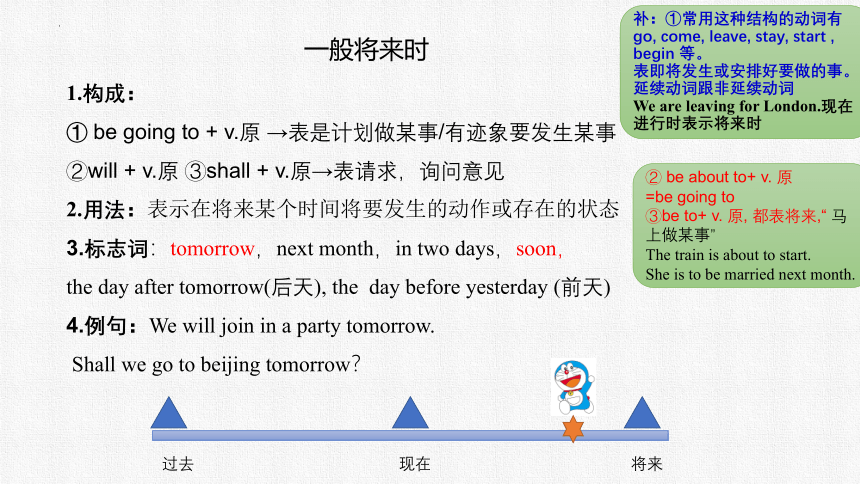
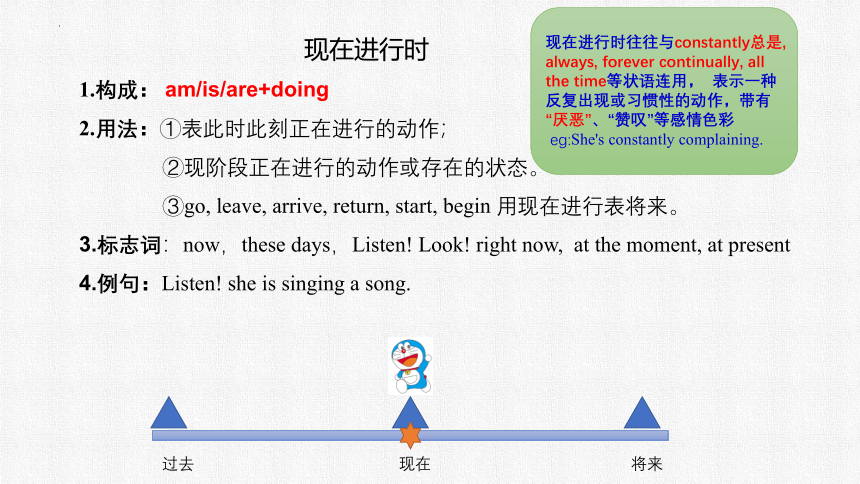
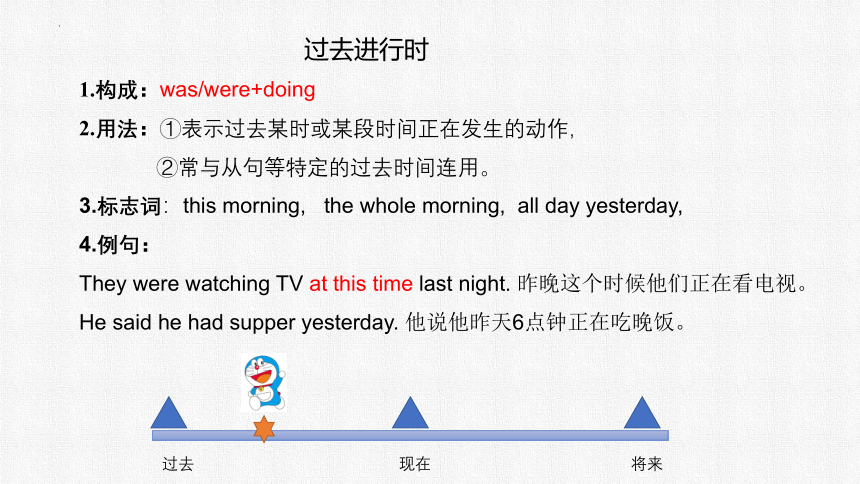
文档简介
(共23张PPT)
专题九 动词的时态
考察内容
动词时态分类
易混辨析
时态 现在 过去 将来 过去将来
一般 一般现在 一般过去 一般将来 过去将来
进行 现在进行 过去进行 将来进行 过去将来进行
完成 现在完成 过去完成 将来完成 过去将来完成
完成进行 现在完成进行 过去完成进行 将来完成进行 过去将来完成进行时
动词时态(16种)
考点一 初中主要考察时态(8种)
①一般现在时
②一般过去时
③一般将来时
④现在进行时
⑤过去进行时
⑥现在完成时
⑦过去完成时
⑧过去将来时
一般现在时
1.构成: do/does/动词原形/三单
2.用法:①表经常性或习惯性的动作或存在的状态
②客观事实或普遍真理。
3.标志词:always, often, usually, sometimes, once a week, every day, never, hardly ever(几乎不), on Monday等.
4.例句:He often goes to school by bike.
The earth goes around the sun.
过去
现在
将来
在含时间和条件状语从句的复合句中如由when, if, as soon as,before, until,once, the moment等,用一般现在表将来,即主将从现。
eg:I will go with you as soon as I finish my work.
一般过去时
1.构成: 主语+过去式
2.用法:①表示过去发生的动作或状态;
②也可表示过去经常或反复发生的动作。
3.标志词:last night, yesterday, last week, some years ago, in 1995, in the past, the other day, at that time, just now.
4.例句:Last week Tom made a model plane with his friend Jack.
过去
现在
将来
一般将来时
1.构成:
① be going to + v.原 →表是计划做某事/有迹象要发生某事
②will + v.原 ③shall + v.原→表请求,询问意见
2.用法:表示在将来某个时间将要发生的动作或存在的状态
3.标志词:tomorrow,next month,in two days,soon,
the day after tomorrow(后天), the day before yesterday (前天)
4.例句:We will join in a party tomorrow.
Shall we go to beijing tomorrow?
过去
现在
将来
补:①常用这种结构的动词有 go, come, leave, stay, start , begin 等。
表即将发生或安排好要做的事。延续动词跟非延续动词
We are leaving for London.现在进行时表示将来时
② be about to+ v. 原
=be going to
③be to+ v. 原, 都表将来,“ 马上做某事”
The train is about to start.
She is to be married next month.
现在进行时
1.构成: am/is/are+doing
2.用法:①表此时此刻正在进行的动作;
②现阶段正在进行的动作或存在的状态。
③go, leave, arrive, return, start, begin 用现在进行表将来。
3.标志词:now,these days,Listen! Look! right now, at the moment, at present
4.例句:Listen! she is singing a song.
过去
现在
将来
现在进行时往往与constantly总是, always, forever continually, all the time等状语连用, 表示一种反复出现或习惯性的动作,带有“厌恶”、“赞叹”等感彩
eg:She's constantly complaining.
过去进行时
1.构成:was/were+doing
2.用法:①表示过去某时或某段时间正在发生的动作,
②常与从句等特定的过去时间连用。
3.标志词:this morning, the whole morning, all day yesterday,
4.例句:
They were watching TV at this time last night. 昨晚这个时候他们正在看电视。 He said he had supper yesterday. 他说他昨天6点钟正在吃晚饭。
过去
现在
将来
现在完成时
1.构成:① 主+ has/ have +done
2.用法:①表示过去的动作对现在造成了影响和结果,它常与already,yet,never,ever,just,before,once,recently,so far,up to now等副词连用。
eg:Have you read the book yet?你看了那本书吗?
②现在完成时表示过去已经开始,持续到现在(还有可能持续下去)常与 for + 时间段, since+ 时间点 连用, 多为延续性动词。
eg:I haven’t watched TV for two weeks.
过去
现在
将来
现在完成时
3.句型
(1) 主语+have done +since句(过去时)
My aunt has taught English since she came to the school.
(2) It is/ has been + 一段时间+ since从句(过去时)
It is five years since he joined the army.
(3) This/ It is the first/ second...time +that从句(完成时)
This is the first time that I have come here.
过去
现在
将来
现在完成时
补:非延续性动作与延续性动作
非延续动词 延续动词(完成时)
buy, borrow have,keep
die, finish be dead, be over
open, go be open, be there
join, leave be in, be away
put on, wake up wear, be awake
catch a cold , fall asleep have a cold, be asleep
arrive, reach be
eg:He has borrowed my dictionary for two days.
→He has kept my dictionary for two days.
过去完成时
1.结构:主语+had done
2.用法:①一件事情发生在过去,而另一件事先于它发生(表“过去的过去”)发生在前的事情的动词用过去完成。
I had learnt) learn 5000 words before I entered the university. 2015
②表示从过去某一时间开始,一直延续到过去的另一时间的动作,常用的时间状语有:until/ by/ before/ by the end of +“表过去的某一时间”。
By the end of last year we had built five new houses.
过去
现在
将来
√
过去将来时
1.结构:主语+would/was(were)going to+动词原形……
2.用法:①从过去某一段时间看将来发生的动作或存在的状态,常用于宾从中
He said that he would buy some fruit for his sister.他说他将会买一些水果给他姐姐。
②go, come, leave, arrive, start 用过去进行时表过去按计划即将发生的事
He said he was coming this evening.
过去
现在
将来
考点二 易混辨析
1.have been to ,have gone to 与have been in 三种结构的区别
<1>have been to 过去曾经去过某地(现已回来)
<2>have gone to 已去了某地
→(①现在还没回来②或途中③或已经到达了目的地)
<3>have been in 已在某地(待了多久)【该地小地点用 at, 大地点用in。】
eg:Jim has gone to London with his family.吉姆已和他的家人去了伦敦。
Have you been to Beijing before 你以前过去北京吗?
3. The Greens have been in China for two years.格林一家在中国已两年了。
4.Mr. Wang has been at this school for ten years.王老师已在这个学校十年了。
2.一般过去时与现在完成时之比较
A.<1>一般过去时:过去时态,侧重于表示过去的动作,与现在无关,强调动作;
<2>现在完成时:与现在有关的时态,属现在时态范畴;强调过去的事情对现在的影响,强调的是影响。
eg: I saw this film yesterday.(强调动作)
I have seen this film. (强调的动作的影响)
B.连用的时间状语不同:
<1>现在完成时:already, yet, still, just, so far, in the last/ past(years…), before, ever, never, since, for等。
<2>一般过去时:yesterday, last week,…ago, in1980, in October, just now等。
考点二 易混辨析
3.不用进行时的动词
<1>事实状态的动词:have= belong to, possess, cost, owe, exist, include, contain, matter, weigh, measure continue
eg:I have two brothers.
<2>心理状态的动词: know, realize, think; see, believe, suppose, imagine, agree, recognize, remember, want, need, forget, prefer, mean, understand, love, hate
eg:He loves her very much.
<3> 瞬间动词:accept, receive, complete, finish, give, allow, decide, refuse.
eg:I accept your advice.
<4>系动词:be,become,seem, remain, lie, see, look,hear, smell, feel, taste, get, become, turn
eg:You seem a little tired.
考点二 易混辨析
Ⅰ. 用所给词的适当形式填空
1.I’m sorry that I didn’t answer your phone. I _______ (listen) to music and didn’t hear the ring.
2. Mr. Liu isn’t here now. He _______ (go) to Beijing.
3. My mother often _______ (enjoy) the TV plays in the evening.
4. We know each other well because we _______ (be) friends since ten years ago.
5. I _______ (visit) my aunt on the farm last weekend.
答案:1. was listening 2. has gone 3. enjoys 4. have been 5. visited
练一练
Ⅱ. 单项选择
1. —I called you last night, but you didn’t answer it. —I’m terribly sorry. I _______ a meeting at that time.
A. had B. was having C. am having
【解析】选B。由at that time可知过去打电话这一动作发生的时候开会这一动作正在发生,故选B。
2. This silk dress _______ so smooth. It’s made in China.
A. feels B. smells C. sounds D. tastes
【解析】选A。句意:这件丝绸的衣服摸起来这么光滑。它是中国制造的。feel“摸起来”;smell“闻起来”; sound“听起来”; taste“尝起来”。故选A。
3. —Where is Mr Black I have something important to tell him. —You can’t find him. He _______ Hong Kong.
A. will go to B. would go to
C. has gone to D. has been to
【解析】选C。由“你找不到他。”可知他去香港了,还没回来,故选C。
4. —Have you ever been to Shanghai
—Yes. I _______ there a few months ago.
A. have been B. went
C. have gone
【解析】选B。由时间状语a few months ago“几个月前”可知时态为一般过去时,故答案为B。
5. Chen Guangbiao says he _______ all his money to charities when he dies.
A. leaves B. left
C. will leave D. would leave
【解析】选C。when引导的时间状语从句用一般现在时,主句多用将来时。
6. There _______ an English party in our school tomorrow evening.
A. have B. will have
C. is going to have D. will be
【解析】选D。由时间状语tomorrow evening可知时态为一般将来时,there be结构的将来时为there will be/there is going to be。故选D。
7. —Hello, may I speak to Zhang Jun
—Oh, sorry! He _______ to Guiyang.
A. has been B. has gone C. went
【解析】选B。由句意可知张军去贵阳还没回来,故用has gone to。
8. I _______ my hometown for a long time. I really miss it!
A. left B. went away from
C. have left D. have been away from
【解析】选D。根据句意“我离开家乡很长时间了。我真的想念它!”可知用现在完成时,排除A与B。由时间状语“for a long time”可知,此处应该使用延续性动词,排除C。故选D。
9. There _______ some flowers on the teacher’s desk just now, but now there _______ nothing on it.
A. have; has B. were; was
C. were; is D. has; has
【解析】选B。there be结构谓语动词为be动词。由just now可知时态为一般过去时, 由now可知时态为一般现在时,故选B。
10. —I called you at 4: 00 yesterday afternoon, but no one answered.
—Sorry, I _______ with my friends at that time.
A. swim B. swam
C. will swim D. was swimming
【解析】选D。 由时间状语at that time可知其回答是昨天下午四点正在游泳,故选D。
11. Don’t make so much noise. The children _______ an English lesson.
A. have B. are having C. were having
【解析】选B。由前句“别制造这么多噪音。”可知孩子们上英语课这一动作正在进行。
12. She _______ this book for nearly three weeks.
A. has borrowed B. has lent
C. has bought D. has kept
【解析】选D。由时间状语for nearly three weeks可知谓语用延续性动词。borrow,lend, buy均为非延续性动词,不能与一段时间连用。故选D。
13. —How long has Sam been skating
—He _______ for five hours.
A. have been skating B. has been skating
C. was skating D. has been skated
【解析】选B。由问句的时态为现在完成进行时可知答句时态也用现在完成进行时,故选B。
14. How I wish I could sleep longer! However, I had to get up as soon as the alarm clock _______.
A. ran off B. went off C. took off
【解析】选B。 闹钟发出响声用go off。
15. —Can your father drive
—Yes, and he _______ to work every day.
A. is driving B. drove
C. drives D. has driven
【解析】选C。由主语是第三人称单数,且时间状语是every day可知谓语动词用第三人称单数形式。故选C。
专题九 动词的时态
考察内容
动词时态分类
易混辨析
时态 现在 过去 将来 过去将来
一般 一般现在 一般过去 一般将来 过去将来
进行 现在进行 过去进行 将来进行 过去将来进行
完成 现在完成 过去完成 将来完成 过去将来完成
完成进行 现在完成进行 过去完成进行 将来完成进行 过去将来完成进行时
动词时态(16种)
考点一 初中主要考察时态(8种)
①一般现在时
②一般过去时
③一般将来时
④现在进行时
⑤过去进行时
⑥现在完成时
⑦过去完成时
⑧过去将来时
一般现在时
1.构成: do/does/动词原形/三单
2.用法:①表经常性或习惯性的动作或存在的状态
②客观事实或普遍真理。
3.标志词:always, often, usually, sometimes, once a week, every day, never, hardly ever(几乎不), on Monday等.
4.例句:He often goes to school by bike.
The earth goes around the sun.
过去
现在
将来
在含时间和条件状语从句的复合句中如由when, if, as soon as,before, until,once, the moment等,用一般现在表将来,即主将从现。
eg:I will go with you as soon as I finish my work.
一般过去时
1.构成: 主语+过去式
2.用法:①表示过去发生的动作或状态;
②也可表示过去经常或反复发生的动作。
3.标志词:last night, yesterday, last week, some years ago, in 1995, in the past, the other day, at that time, just now.
4.例句:Last week Tom made a model plane with his friend Jack.
过去
现在
将来
一般将来时
1.构成:
① be going to + v.原 →表是计划做某事/有迹象要发生某事
②will + v.原 ③shall + v.原→表请求,询问意见
2.用法:表示在将来某个时间将要发生的动作或存在的状态
3.标志词:tomorrow,next month,in two days,soon,
the day after tomorrow(后天), the day before yesterday (前天)
4.例句:We will join in a party tomorrow.
Shall we go to beijing tomorrow?
过去
现在
将来
补:①常用这种结构的动词有 go, come, leave, stay, start , begin 等。
表即将发生或安排好要做的事。延续动词跟非延续动词
We are leaving for London.现在进行时表示将来时
② be about to+ v. 原
=be going to
③be to+ v. 原, 都表将来,“ 马上做某事”
The train is about to start.
She is to be married next month.
现在进行时
1.构成: am/is/are+doing
2.用法:①表此时此刻正在进行的动作;
②现阶段正在进行的动作或存在的状态。
③go, leave, arrive, return, start, begin 用现在进行表将来。
3.标志词:now,these days,Listen! Look! right now, at the moment, at present
4.例句:Listen! she is singing a song.
过去
现在
将来
现在进行时往往与constantly总是, always, forever continually, all the time等状语连用, 表示一种反复出现或习惯性的动作,带有“厌恶”、“赞叹”等感彩
eg:She's constantly complaining.
过去进行时
1.构成:was/were+doing
2.用法:①表示过去某时或某段时间正在发生的动作,
②常与从句等特定的过去时间连用。
3.标志词:this morning, the whole morning, all day yesterday,
4.例句:
They were watching TV at this time last night. 昨晚这个时候他们正在看电视。 He said he had supper yesterday. 他说他昨天6点钟正在吃晚饭。
过去
现在
将来
现在完成时
1.构成:① 主+ has/ have +done
2.用法:①表示过去的动作对现在造成了影响和结果,它常与already,yet,never,ever,just,before,once,recently,so far,up to now等副词连用。
eg:Have you read the book yet?你看了那本书吗?
②现在完成时表示过去已经开始,持续到现在(还有可能持续下去)常与 for + 时间段, since+ 时间点 连用, 多为延续性动词。
eg:I haven’t watched TV for two weeks.
过去
现在
将来
现在完成时
3.句型
(1) 主语+have done +since句(过去时)
My aunt has taught English since she came to the school.
(2) It is/ has been + 一段时间+ since从句(过去时)
It is five years since he joined the army.
(3) This/ It is the first/ second...time +that从句(完成时)
This is the first time that I have come here.
过去
现在
将来
现在完成时
补:非延续性动作与延续性动作
非延续动词 延续动词(完成时)
buy, borrow have,keep
die, finish be dead, be over
open, go be open, be there
join, leave be in, be away
put on, wake up wear, be awake
catch a cold , fall asleep have a cold, be asleep
arrive, reach be
eg:He has borrowed my dictionary for two days.
→He has kept my dictionary for two days.
过去完成时
1.结构:主语+had done
2.用法:①一件事情发生在过去,而另一件事先于它发生(表“过去的过去”)发生在前的事情的动词用过去完成。
I had learnt) learn 5000 words before I entered the university. 2015
②表示从过去某一时间开始,一直延续到过去的另一时间的动作,常用的时间状语有:until/ by/ before/ by the end of +“表过去的某一时间”。
By the end of last year we had built five new houses.
过去
现在
将来
√
过去将来时
1.结构:主语+would/was(were)going to+动词原形……
2.用法:①从过去某一段时间看将来发生的动作或存在的状态,常用于宾从中
He said that he would buy some fruit for his sister.他说他将会买一些水果给他姐姐。
②go, come, leave, arrive, start 用过去进行时表过去按计划即将发生的事
He said he was coming this evening.
过去
现在
将来
考点二 易混辨析
1.have been to ,have gone to 与have been in 三种结构的区别
<1>have been to 过去曾经去过某地(现已回来)
<2>have gone to 已去了某地
→(①现在还没回来②或途中③或已经到达了目的地)
<3>have been in 已在某地(待了多久)【该地小地点用 at, 大地点用in。】
eg:Jim has gone to London with his family.吉姆已和他的家人去了伦敦。
Have you been to Beijing before 你以前过去北京吗?
3. The Greens have been in China for two years.格林一家在中国已两年了。
4.Mr. Wang has been at this school for ten years.王老师已在这个学校十年了。
2.一般过去时与现在完成时之比较
A.<1>一般过去时:过去时态,侧重于表示过去的动作,与现在无关,强调动作;
<2>现在完成时:与现在有关的时态,属现在时态范畴;强调过去的事情对现在的影响,强调的是影响。
eg: I saw this film yesterday.(强调动作)
I have seen this film. (强调的动作的影响)
B.连用的时间状语不同:
<1>现在完成时:already, yet, still, just, so far, in the last/ past(years…), before, ever, never, since, for等。
<2>一般过去时:yesterday, last week,…ago, in1980, in October, just now等。
考点二 易混辨析
3.不用进行时的动词
<1>事实状态的动词:have= belong to, possess, cost, owe, exist, include, contain, matter, weigh, measure continue
eg:I have two brothers.
<2>心理状态的动词: know, realize, think; see, believe, suppose, imagine, agree, recognize, remember, want, need, forget, prefer, mean, understand, love, hate
eg:He loves her very much.
<3> 瞬间动词:accept, receive, complete, finish, give, allow, decide, refuse.
eg:I accept your advice.
<4>系动词:be,become,seem, remain, lie, see, look,hear, smell, feel, taste, get, become, turn
eg:You seem a little tired.
考点二 易混辨析
Ⅰ. 用所给词的适当形式填空
1.I’m sorry that I didn’t answer your phone. I _______ (listen) to music and didn’t hear the ring.
2. Mr. Liu isn’t here now. He _______ (go) to Beijing.
3. My mother often _______ (enjoy) the TV plays in the evening.
4. We know each other well because we _______ (be) friends since ten years ago.
5. I _______ (visit) my aunt on the farm last weekend.
答案:1. was listening 2. has gone 3. enjoys 4. have been 5. visited
练一练
Ⅱ. 单项选择
1. —I called you last night, but you didn’t answer it. —I’m terribly sorry. I _______ a meeting at that time.
A. had B. was having C. am having
【解析】选B。由at that time可知过去打电话这一动作发生的时候开会这一动作正在发生,故选B。
2. This silk dress _______ so smooth. It’s made in China.
A. feels B. smells C. sounds D. tastes
【解析】选A。句意:这件丝绸的衣服摸起来这么光滑。它是中国制造的。feel“摸起来”;smell“闻起来”; sound“听起来”; taste“尝起来”。故选A。
3. —Where is Mr Black I have something important to tell him. —You can’t find him. He _______ Hong Kong.
A. will go to B. would go to
C. has gone to D. has been to
【解析】选C。由“你找不到他。”可知他去香港了,还没回来,故选C。
4. —Have you ever been to Shanghai
—Yes. I _______ there a few months ago.
A. have been B. went
C. have gone
【解析】选B。由时间状语a few months ago“几个月前”可知时态为一般过去时,故答案为B。
5. Chen Guangbiao says he _______ all his money to charities when he dies.
A. leaves B. left
C. will leave D. would leave
【解析】选C。when引导的时间状语从句用一般现在时,主句多用将来时。
6. There _______ an English party in our school tomorrow evening.
A. have B. will have
C. is going to have D. will be
【解析】选D。由时间状语tomorrow evening可知时态为一般将来时,there be结构的将来时为there will be/there is going to be。故选D。
7. —Hello, may I speak to Zhang Jun
—Oh, sorry! He _______ to Guiyang.
A. has been B. has gone C. went
【解析】选B。由句意可知张军去贵阳还没回来,故用has gone to。
8. I _______ my hometown for a long time. I really miss it!
A. left B. went away from
C. have left D. have been away from
【解析】选D。根据句意“我离开家乡很长时间了。我真的想念它!”可知用现在完成时,排除A与B。由时间状语“for a long time”可知,此处应该使用延续性动词,排除C。故选D。
9. There _______ some flowers on the teacher’s desk just now, but now there _______ nothing on it.
A. have; has B. were; was
C. were; is D. has; has
【解析】选B。there be结构谓语动词为be动词。由just now可知时态为一般过去时, 由now可知时态为一般现在时,故选B。
10. —I called you at 4: 00 yesterday afternoon, but no one answered.
—Sorry, I _______ with my friends at that time.
A. swim B. swam
C. will swim D. was swimming
【解析】选D。 由时间状语at that time可知其回答是昨天下午四点正在游泳,故选D。
11. Don’t make so much noise. The children _______ an English lesson.
A. have B. are having C. were having
【解析】选B。由前句“别制造这么多噪音。”可知孩子们上英语课这一动作正在进行。
12. She _______ this book for nearly three weeks.
A. has borrowed B. has lent
C. has bought D. has kept
【解析】选D。由时间状语for nearly three weeks可知谓语用延续性动词。borrow,lend, buy均为非延续性动词,不能与一段时间连用。故选D。
13. —How long has Sam been skating
—He _______ for five hours.
A. have been skating B. has been skating
C. was skating D. has been skated
【解析】选B。由问句的时态为现在完成进行时可知答句时态也用现在完成进行时,故选B。
14. How I wish I could sleep longer! However, I had to get up as soon as the alarm clock _______.
A. ran off B. went off C. took off
【解析】选B。 闹钟发出响声用go off。
15. —Can your father drive
—Yes, and he _______ to work every day.
A. is driving B. drove
C. drives D. has driven
【解析】选C。由主语是第三人称单数,且时间状语是every day可知谓语动词用第三人称单数形式。故选C。
同课章节目录
- 词法
- 名词
- 动词和动词短语
- 动词语态
- 动词时态
- 助动词和情态动词
- 非谓语动词
- 冠词
- 代词
- 数词和量词
- 形容词副词及其比较等级
- 介词和介词短语
- 连词和感叹词
- 构词法
- 相似、相近词比较
- 句法
- 陈述句
- 一般疑问句和否定疑问句
- 特殊疑问句及选择疑问句
- 反意疑问句
- 存在句(There be句型)
- 宾语从句
- 定语从句
- 状语从句
- 主谓一致问题
- 简单句
- 并列句
- 复合句
- 主谓一致
- 主、表语从句
- 名词性从句
- 直接引语和间接引语
- 虚拟语气
- 感叹句
- 强调句
- 倒装句
- 祈使句
- 句子的成分
- 句子的分类
- 题型专区
- 单项选择部分
- 易错题
- 完形填空
- 阅读理解
- 词汇练习
- 听说训练
- 句型转换
- 补全对话
- 短文改错
- 翻译
- 书面表达
- 任务型阅读
- 语法填空
- 其他资料
